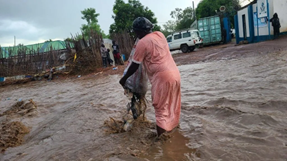South Sudan Ministry of Health has urged the public to adhere to health precautions against Ebola, following confirmation in neighboring Uganda.
Last week Uganda’s Ministry of Health confirmed the outbreak of the Ebola virus, putting the neighboring countries, including South Sudan, at risk should they fail to put in place proper health measures.
According to a statement read by James Hoth, Minister of Labor, who acted on behalf of Health Minister, the country has not confirmed any case but is on high alert.
Minister Hoth called on the citizens to follow all the necessary health precautions in order to help the health authorities effectively prevent Ebola in the country.
He revealed that the minister of health has alerted the health authorities in Nimule, Juba International Airport, and other points of entry to put in place necessary measures such as screening and isolating to timely identify suspect cases.
“The Ministry of Health also urges the public to adhere to the following measures: avoid physical contact with individuals showing signs of Ebola, ensure strict hand hygiene, and wash hands regularly with soap and water or use alcohol-based hand sanitizers (ABHS). Avoid direct contact with bodily fluids, including urine, blood, sweat, saliva, vomit, and stool from suspected Ebola patients, avoiding handling bodies of persons dying from Ebola-like symptoms, he explained.
On his part, Dr. Kediende Chong, Director General for Primary Health Service (PHS), called on the public to respect the directives from the health ministry to ensure effective prevention.
He expressed that noncompliance with the health measures remains a challenge in South Sudan, particularly during times of any disease outbreak.
On a separate note, ABC News reported that Ugandan authorities on Monday began a clinical trial of a vaccine against the Sudan strain of Ebola that has killed one person.
Health workers and others exposed to the Ebola strain are being targeted in the study, which began four days after Uganda announced the death of a nurse in the capital, Kampala. Two more cases were confirmed on Monday in relatives of the first victim.
Officials are investigating the source of the outbreak. Ebola is spread by contact with bodily fluids of an infected person or contaminated materials. Symptoms include fever, vomiting, diarrhea, muscle pain, and, at times, internal and external bleeding.
Uganda has had multiple Ebola outbreaks, including one in 2000 that killed hundreds. Tracing contacts is key to stemming the spread of Ebola, which manifests as a viral hemorrhagic fever.
Scientists don’t know the natural reservoir of Ebola, but they suspect the first person infected in an outbreak acquired the virus through contact with an infected animal or by eating its raw meat.
Ebola was discovered in 1976 in two simultaneous outbreaks in South Sudan and Congo, where it occurred in a village near the Ebola River, after which the disease is named.




